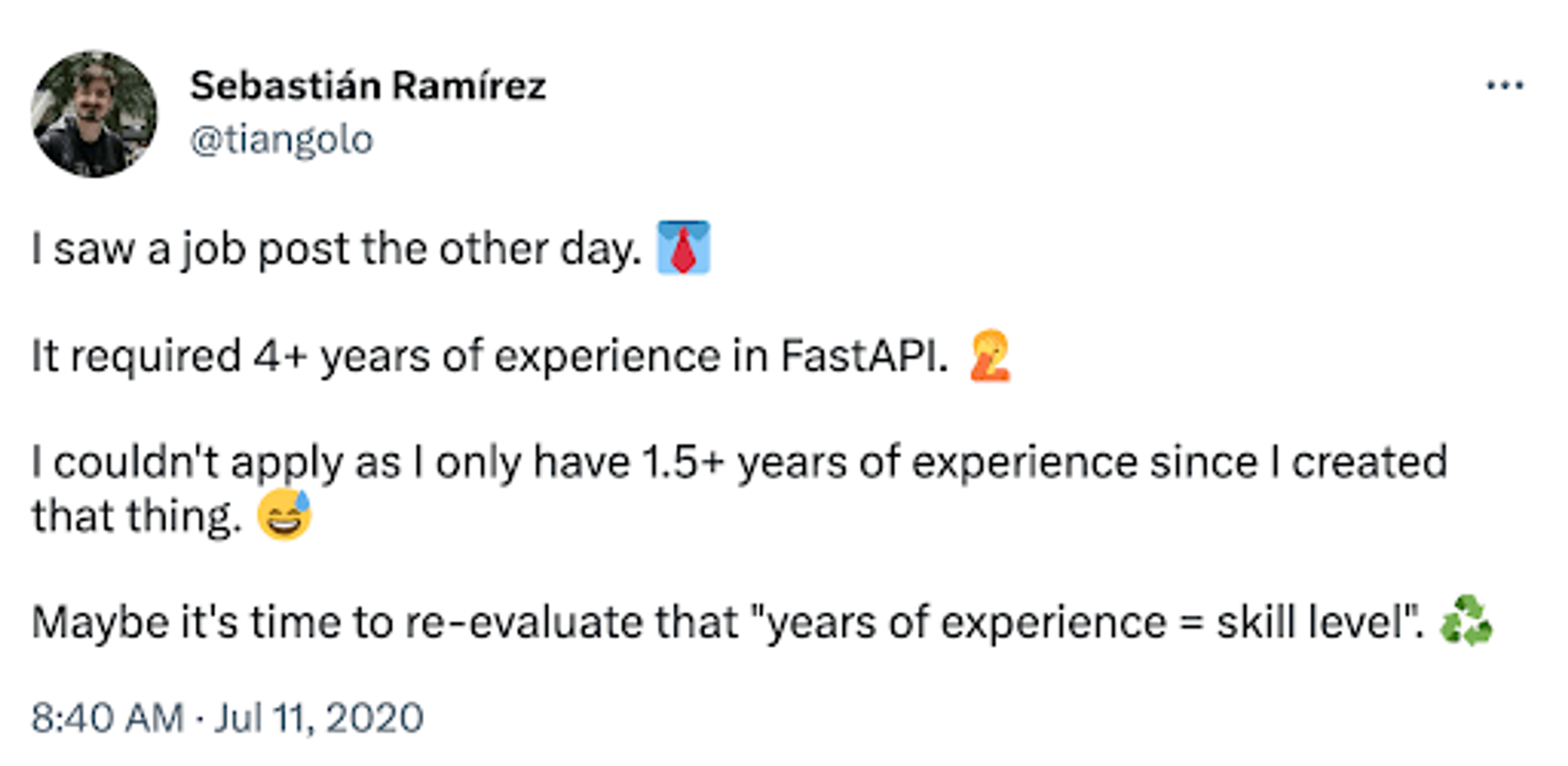Crafting a job description can feel like designing your dream candidate. It’s an opportunity to list all of the skills and qualifications your ideal applicant could possess.
One checkbox that almost always makes the list? Years of experience.
But filtering on a candidate’s job history can be more of a hindrance than a help. This is especially true when you’re recruiting early talent and tech talent, who don’t necessarily have a long job history but who have the capabilities, training, and desire to contribute.
That’s why strategic employers are moving away from the years of experience filter to focus on what actually matters most: skills and knowledge.
Years of experience: What’s the problem with this traditional criteria?
Writing a job posting without a required experience level might feel unnatural, but there are a few compelling reasons why this classic filter can actually screen qualified candidates out.
1. It fails to keep pace with tech innovation
While technology gets a bad rap for replacing human workers with robots, the truth is that technology doesn’t just eliminate jobs—it creates them too. As technology advances, more tech-skilled workers are needed to spearhead innovation.
Just think about some of the in-demand tech roles today that would’ve inspired nothing more than confused looks and blank stares a mere decade ago:
- Artificial intelligence developer
- Blockchain analyst
- Cloud architect
- Cybersecurity specialist
- Virtual reality developer
And that’s only the beginning. Technology—and the careers that support it—moves at a breakneck pace. In fact, it’s been reported that 85% of jobs that will exist in 2030 haven’t actually been invented yet. These are roles that aren’t limited to the tech industry—consider finance, government, energy, and yours.
Filtering out candidates based on years of experience means applying an archaic filter to a cutting-edge industry. And, as Sebastián Ramírez, the creator of FastAPI, experienced, you could mistakenly ask candidates to meet a standard that’s quite literally impossible.

2. It doesn’t showcase the capabilities of early talent
The “years of experience” filter might feel like it reveals a lot about what a candidate brings to the table. If they have over two years on the job, they must already have mastered this skill and gained proficiency with this piece of software.
But in reality, years of experience tells you precisely one thing: how long the applicant has collected a paycheck. That’s all.
It’s tempting to assign a lot of weight and importance to the time an employee has already invested in the workforce, but in doing so, you’re only making assumptions. Tenure isn’t always representative of knowledge, skills, and talent.
It’s important to remember that Gen Z is entering the workforce with a lot of enthusiasm and know-how—but they don’t necessarily have the perspective and confidence of someone who’s been navigating the working world for years.
The “years of experience” requirement shrinks your pipeline.
3. It threatens your application rate
Here’s the biggest problem with the “years of experience” requirement: It discourages skilled and highly-qualified candidates from applying to your open roles.
Early talent is typically in the “0-5 years of experience” range. So why create job descriptions aimed at early talent that state “3-5 years of experience”? This can discourage new graduates from applying since they believe they don’t meet the years of experience requirement—even though they’ve recently acquired a degree or certificate in the exact skills you need.
Learn how Goldman Sachs uses skills-based recruiting to attract early talent applicants.
When recent graduates see a bold experience requirement in your job posting, it’s an immediate barrier—and one that often feels insurmountable. Most will move on and look for employers that have more reasonable expectations, particularly for roles that are branded as “entry level.”

Today, every company is a tech company.
40% of the Class of 2023 are open to applying to more industries.
Learn moreGoing beyond quantifiable qualifications
Thinking critically about your years of experience requirements—and questioning whether you even need them in the first place—supports more inclusive recruiting.
However, inclusive recruiting is not synonymous with “having no standards.” Employers absolutely can and should have specific criteria they’re looking for in successful applicants. The trick is being more open-minded about what those standards are—and how to evaluate them. Here’s some inspiration to get the wheels turning.
1. Revamp your job descriptions
It likely goes without saying that your job postings will need a bit of an overhaul, particularly if you’ve been reusing the same tired template over and over again. But what goes in a job description if you’re not listing the required experience or a specific college degree?
The traditional approach focuses on this question: What boxes does a candidate need to check? Flip the script and challenge yourself to answer deeper, more meaningful questions about the open position like:
- What skills will make someone successful in this role?
- What impact do we want this role to have on our organization?
- What broader team or company goals will this role support?
- What career path will this role put someone on (or help them discover)?
Doing so keeps you and the entire hiring team focused more on the outcomes of the position—rather than creating a laundry list of prescriptive inputs to make it happen.
2. Identify other meaningful experiences
Experience simply means to directly observe or participate in something. But somewhere along the line, it was boiled down to hands-on work in a paid role.
Experience comes in all shapes and forms outside of on-the-job responsibilities, and it’s well worth considering and honoring those less-traditional avenues like:
- Apprenticeships
- Bootcamps
- Certifications
- Clubs and organizations
- Course work
- Internships
- Part-time jobs
- Personal hobbies
- Projects
- Side hustles
- Volunteer work
All of those can provide knowledge and skill-building that’s equally significant (if not more so) to on-the-job experience, particularly when many offer training that’s far more targeted and timely than college curriculum.
Maybe you can personally relate to racking up experience early in your career that doesn’t directly map to what you’re doing now. Perhaps a student who has waitressing experience applies to your role, and you discount that experience because you’re not hiring for a waitress position. But that student might have fantastic customer service skills, the ability to think on their feet, and agility in high pressure situations.
3. Consider new ways to evaluate candidates
If your experience requirements aren’t traditional, your evaluation methods shouldn’t be either. Fortunately, technical interviews typically include steps like:
- Skills-based assessments, or a coding challenge
- Test projects, or whiteboarding
- Work samples of what the candidate has produced
These approaches, on their own or in combination, rely on a candidate’s current skills and knowledge, and they tell you more about an applicant’s aptitude than a single bullet point on a resume ever could.
There are plenty of out-of-the-box ways you can get a solid grasp on the know-how of job applicants without relying on their job history. Explore speed interviews, use situational interview questions, behavioral interviews over lunch, and other ways to surface a student’s skills, interests, and academic highlights. You can check with your school partners for suggestions for breaking the traditional interview mold.

5 ways Gen Z thinks you can improve your interview process
Find out howIt’s time to prioritize tenacity over tenure
For decades, listing an experience requirement was as inherent to job descriptions as the job title itself. But when it comes to recruiting early talent—and especially tech talent—that sort of filter can be more of a barrier than a boost.
Employers are better served by focusing on the knowledge and skills required to do the job, whether they were obtained through “traditional” experience or not.
In the end, maybe it’s time for the “years of experience” qualification to go the way of other outdated recruiting methods, like newspaper wanted ads and faxing a resume: complete and total obsolescence.
